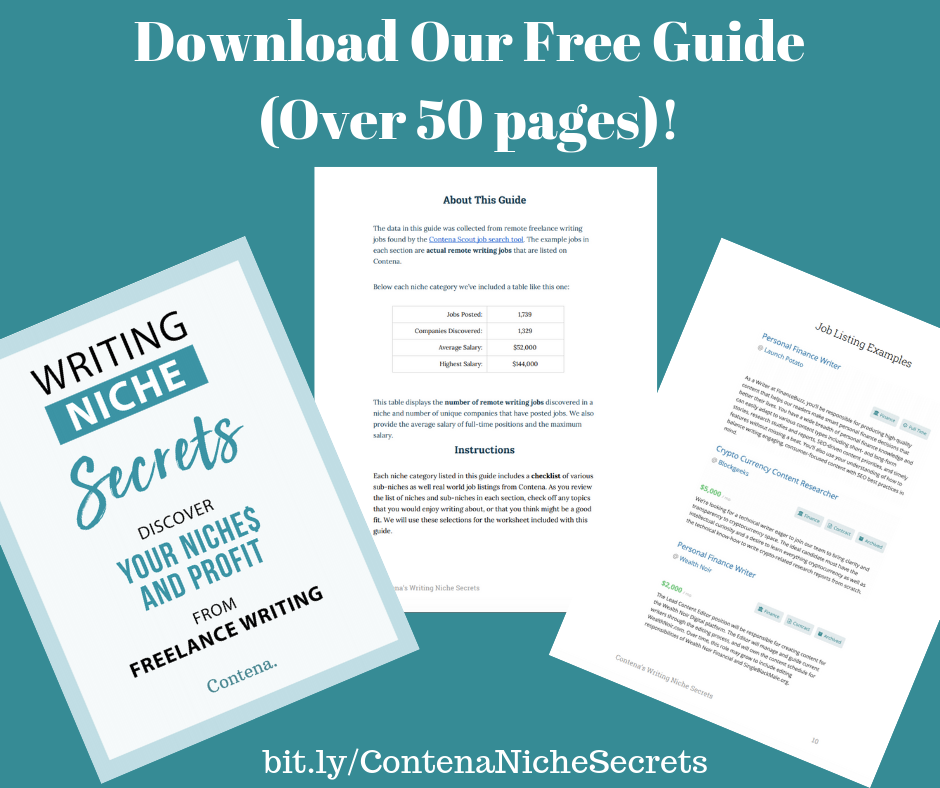Image credit: https://www.aresearchguide.com/
How many of those articles have you seen that say, “I made 6 figures writing in the first 3 months!!” or “How I made 100K as a writer!!” and while that person has found success, there’s something about it that doesn’t feel like you could do it.
Those articles are a bit of a bummer, huh?
The truth is, many people do make a living as freelance writers, but what that looks like is so different from person to person. (Honestly, that’s part of what I love about freelancing!)
What does “make a living” mean to you?
This is an important place to start when you’re starting to wonder about making a living as a freelance writer.
I live in an expensive area of the already expensive Bay Area and I have two kids. What I consider “making a living” is likely going to be higher than a single 20-something in the Midwest.
And that person’s definition of making of living is different than the person just finishing college, or the person who’s a single parent. “Making a living” is a super vague idea and is super specific to the individual.
So, when you’re thinking about becoming a freelance writer, or you’ve already started but you want to ditch another job, start by thinking about what “making a living” means to you.
First off, consider what bills you have to pay monthly:
- Mortgage/rent
- Utilities
- Food
- Car and related costs
- Health and other insurance
- Cable/Internet/Cell phone
- Childcare (if applicable)
- Etc.
Then, consider what additional money you spend (and would like to spend) monthly to make your life enjoyable and plan for the future:
- Entertainment (movies, nights out)
- Clothing
- Travel
- Gym
- Savings and retirement
- Etc.
Take a look at these lists and see if any other costs are missing for you and those in your life you’re responsible for.
Take this number and multiply it by 12.
Then, consider what other costs may come up; you may want to add a number like $5000 to cover things like holiday shopping, unexpected repairs, or emergencies. What this number is, is up to you, but the idea is that you’re coming up with a figure of what it means to “make a living.”
So, when you’re thinking “Can I make a living as a freelance writer?” you need to be clear on what you’re actually asking yourself.
Chances are, the answer is “yes” to any number that you come up with, but how easy it is to reach that number, how quickly, and howyou make that money will look quite different depending on your answer.
For example:
- Person A needs to make $75K a year
- Person B needs to make $45K a year
- Person C needs to make $30K a year
Person A probably needs to get hired for more work than person C, or person A may want to pursue higher-paying niches.
Person C may be able to make 100% of their income goals through freelance writing by securing two anchor clients who pay them $1000/month and doing a few short-term writing projects. Persons A and B may need to diversify a bit and do writing-adjacent work like offering editing services, social media management, or other work.
And all of these people can increase their income by adding in additional side-hustles (the gig-economy is awesome after all!)

Do Freelance Writers Make a Living Only by Writing?
Simple answer? Some do, and some don’t.
Many of the writers I know aim to have the bulk of their paid work be writing, but the reality can be that the work isn’t always predictable. So, in order to meet their financial needs, many writers (myself included) take on other work.
And, there’s nothing wrong with this!!
I love having a few different jobs (though it’s more of a challenge to answer the question “what do you do for work?” because there isn’t one answer!), and they’re all writing-adjacent and use my writing skills: sometimes that’s writing emails, sometimes it’s social media content, and sometimes I do write articles, like this one.
If you take a look at income reports or “I made 6 figures” articles, you’ll tend to see that most people have diversified their income. This is just smart. Remember that income diversity may not always be related to writing. Maybe they also have an Etsy shop, or do some freelance photography, or they teach.
You might want to keep your full-time job for a while. That’s okay- it’s up to you if you want to pursue making a living only from freelance writing.
Another point to think about is that many writers have found ways to create passive income- that’s income that’s generated for you without having to continue to do work. This might be writing a book, developing a course, or having a blog where you generate affiliate sales.
To gain passive income, you do have to do work up front and set the stage, but the payoff can be great and can help maintain or elevate your income. (Did you know that you can become an affiliate for Contena? That means that when you recommend us, and people sign up with your link, you get paid as an affiliate- cool, huh?!)
How can I reach my income goal as a freelane writer?
Let’s get back to that number you came up with. Once you know your income goal, consider how you can reach it.
- How many clients might you need?
- What might you need to charge?
- How many hours do you need to be working?
- Can you start a side hustle?
- Are you making money from any other work?
Over time, chances are you’ll find more of your ideal clients, you’ll become faster and more skilled at writing and you’ll be more knowledgeable about your niche(s); All of this allows you to raise your rates. Along the way, you might find other opportunities to add to your income like paid speaking engagements or coaching other writers.
Bottom line? It can be done- you can make a living as a freelance writer. What that looks like, how long it takes, and the amount and type of work that takes will look different for every person who calls themselves a freelance writer.
The good news is that you can create your own path.
Take the time to consider the magic number for what it means to you to make a living (and chances are that will evolve over time, so don’t forget to revaluate) and then sit down to set some goals and then take action on them!











